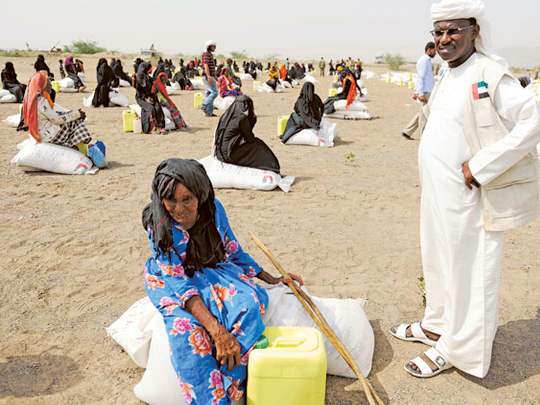
Kuwait: The fate of 10 million Yemenis who urgently need food must become a major global priority, a top UN humanitarian official said.
Valerie Amos, UN Undersecretary-General for Humanitarian Affairs, told Gulf News that Yemen is among the countries that urgently need support.
The humanitarian situation in Yemen, one of the most impoverished nations in the world, is worsening, and the number of people in need of emergency food is growing, humanitarian officials warned.
“We need to push Yemen further up the agenda,” Amos said, before adding “there has been recognition in this [Arab Gulf] region of the need to give financial support in the longer term for development and reconstruction in the country [Yemen].” Valerie was referring to the donors meeting in Saudi Arabia, where the gathering pledged $6.5 billion (Dh23.86 million) to help Yemen — half of it was pledged by Saudi Arabia. Other donors include US, EU and other Arab Gulf countries.
Speaking in an interview on the sidelines of a humanitarian meeting held in Kuwait recently, Amos said the humanitarian crisis in Yemen is a difficult and a complicated one. Other participants in the meeting agreed that Yemen should be the top humanitarian priority for the Arab region.
After last year’s political transition in the country, following a bloody conflict between supporters and opponents of the former regime, the humanitarian picture in Yemen with a nearly 25-million population looks very gloomy, UN officials said.
“You have 10 million people who are short of food, five million of them facing acute malnutrition, and a record number of children under five who have been stunted as a result of that,” Amos said.
Moreover, “you have internally displaced in the south and the north as a result of the conflict, which has led to over 500,000 people being internally displaced and where in addition to that you have a significant refugee flow into the country despite the fragility of the stability that is not being really recognised by the international community,” she added.
Apart from Yemen, Amos singled out Syria in her speech at the meeting, because it is the “situation that is at the top of everybody’s agenda right now”.
So far, nearly 250,000 people have fled Syria to neighbouring countries such as Jordan, Turkey, Lebanon and Iraq.
Asked whether it seems to be a long-term humanitarian crisis, Amos expressed the hope that this “is not the case”. However, if the political efforts failed, there must be long-term plans.
“The people that I spoke to when I was in Syria recently, I think that they want security and stability. That is what they are looking for,” she said. But if the political discussions and negotiations were futile, “then we have to plan for a long-term scenario.”
Amos said it is difficult to classify the human disasters and compare regions, because in each case an individual faces some kind of emergency or disaster situation and needs help, she said.
However, in each case, there are challenges to humanitarian efforts, and Amos explained there are four main challenges.
“One is the humanitarian consequences of political instability and human rights violations, second is the impact of major natural disasters around the world, flooding, earthquakes, and so on. And the third is the mixture of the two. ….the fourth is actually, what we call slow-on-set crisis like food insecurity where it is not a natural disaster now [but] it is something that is being done over a long period of time.”












